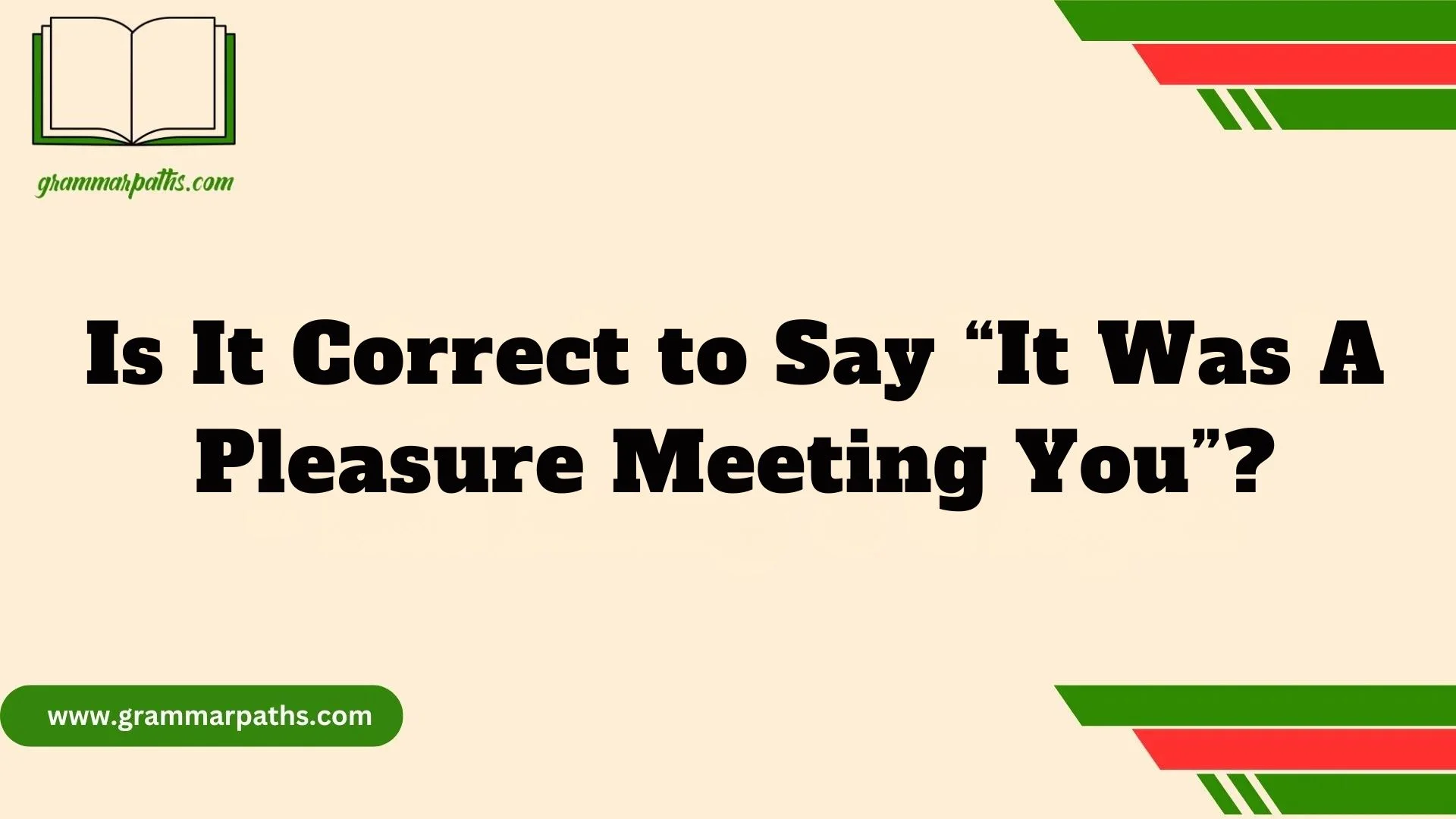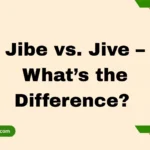When I end a conversation with someone new – whether after a job interview, a Zoom call, or a casual chat with a client – I know that how I say goodbye is just as important as how I start. The phrase “It Was a Pleasure Meeting You” is one of the most frequently used phrases because it feels warm, polished, and genuine. After many years of working with different people, I’ve noticed that a thoughtful sign-off leaves a lasting impression. This can lead to a solid follow up or open a future opportunity. The phrase is not only grammatically correct but also appropriate in most situations where showing courtesy is key.
Sometimes, though, using alternatives sounds more natural. In more relaxed settings, you might say, “Great chatting with you,” while in formal ones, “It was an honor connecting” fits better. A good guide provides insight on the right tone, something I learned from a mentor who stressed the value of verbal etiquette. Over time, I gathered practical examples of how shifting phrasing can improve your grammar and communication clarity. Whether face-to-face or online, a few ready-to-use lines can turn a simple farewell into a strong professional touchpoint – and that’s what this article aims to help you master.
What Does “It Was a Pleasure Meeting You” Really Mean?
At its core, the phrase combines three parts:
- “It was a pleasure” – expresses that the experience brought enjoyment or satisfaction.
- “Meeting” – the act of getting acquainted.
- “You” – the person addressed.
Together, this phrase signals gratitude for the interaction, making the other person feel valued. It reflects more than just surface-level politeness—it’s an acknowledgment of mutual respect and openness.
People often use it right after first-time encounters, especially in professional or semi-formal situations. Saying it helps bridge initial unfamiliarity with warmth and friendliness, building trust from the start.
Is It Grammatically Correct to Say “It Was a Pleasure Meeting You”?
Yes, the phrase is grammatically correct and widely accepted. Here’s why:
- The past tense “was” correctly references a completed event (the meeting).
- The gerund “meeting” acts as a noun here, meaning the action of meeting you. Using “meet” (the base verb) would be incorrect in this context.
- The structure follows the pattern: “It + was + a pleasure + [gerund] + you.”
Common grammar mistakes include saying “It was a pleasure to meet you” or “It was pleasure meeting you” without the article “a,” both of which slightly shift the tone or become awkward.
Understanding this subtle grammar helps you sound polished and professional. For example, compare:
- Correct: “It was a pleasure meeting you at the conference.”
- Incorrect: “It was pleasure meeting you at the conference.”
When and Where to Use This Phrase (With Real-Life Examples)
Knowing when to say “It was a pleasure meeting you” ensures you hit the right note every time. Here are some common contexts:
Scenario Example Tone Job interviews “It was a pleasure meeting you and discussing the role.” Professional, formal Conferences “It was a pleasure meeting you at the event yesterday.” Semi-formal, warm Client meetings “It was a pleasure meeting you and your team today.” Business formal Informal coffee chats “It was a pleasure meeting you! Let’s keep in touch.” Friendly, casual
For instance, after a job interview, saying this phrase in an email shows appreciation and professionalism. At networking events, it signals genuine interest and opens doors for future interactions.
Formal vs Informal: Matching the Tone to the Situation
The tone you choose affects how your message lands. Use this quick guide to match your phrase to the occasion:
Formal Situations Informal Situations Business meetings Coffee catch-ups Interviews First dates Client negotiations Casual networking events Corporate events Friends-of-friends introductions
Avoid mixing tones. Saying something too formal at a casual event can sound stiff, while too casual in a business meeting can seem unprofessional.
Tip: When in doubt, lean slightly formal but keep it warm.
Professional Variations for Business and Corporate Settings
Sometimes, a simple “It was a pleasure meeting you” feels repetitive or generic. Here are polished alternatives suited for professional environments:
- “It was a pleasure speaking with you.”
- “Thank you for your time today.”
- “I appreciated our discussion.”
- “I enjoyed learning more about your work.”
- “Looking forward to future collaboration.”
Using these variations helps you tailor your message while sounding sincere. For example, follow up a sales meeting with: “Thank you for your time today. I look forward to the opportunity to work together.”
Casual and Friendly Alternatives for Everyday Use
Not every meeting requires formality. When you want to sound approachable and friendly, try these phrases:
- “Nice meeting you!”
- “Great chatting with you.”
- “I really enjoyed our talk.”
- “It was great to connect.”
- “Had a fun time meeting you.”
These are perfect for social gatherings, informal networking, or new acquaintances in relaxed settings.
How to Follow Up: Email Templates & Messaging Etiquette
Following up after a meeting shows professionalism and keeps connections alive. Here are three easy email templates using “It was a pleasure meeting you” or its alternatives:
Job Interview Follow-Up
Subject: Thank You for the Opportunity
Dear [Name],
It was a pleasure meeting you yesterday to discuss the [Position] role. I appreciate the chance to learn more about your team and company. Please let me know if you need any additional information.
Best regards, [Your Name]
Sales Meeting Follow-Up
Subject: Great Connecting Today
Hi [Name],
Thank you for taking the time to meet with me. I enjoyed our conversation about how we can support your goals. Looking forward to next steps.
Best, [Your Name]
Informal Networking Follow-Up
Subject: Nice Meeting You!
Hey [Name],
It was great meeting you at the event last night. I enjoyed our chat and hope we can stay in touch.
Cheers, [Your Name]
How to Respond to “It Was a Pleasure Meeting You”
When someone says this to you, a thoughtful response can strengthen your connection:
- “The pleasure was mine.” (Classic and polite)
- “Likewise, I enjoyed our meeting.”
- “Thank you—I look forward to working together.”
- “It was great meeting you as well.”
Avoid simply repeating the phrase back; add value by referencing the meeting or expressing enthusiasm for the future.
“It Was a Pleasure Meeting You and Your Team”: Group Etiquette
Addressing multiple people requires tact. Use this phrase when meeting teams or groups:
- “It was a pleasure meeting you and your team.”
- “Thank you all for your time and insights.”
- “I appreciate everyone’s contributions during the meeting.”
In emails, it’s polite to mention the group collectively and, if appropriate, call out specific individuals for personalized thanks.
Adding Time References: “It Was a Pleasure Meeting You Yesterday”
Adding temporal markers can clarify context but use them sparingly.
Examples:
- “It was a pleasure meeting you yesterday.”
- “I enjoyed our conversation last week.”
- “Thanks for meeting with me earlier today.”
Avoid awkwardness by ensuring the time reference adds clarity or relevance, especially in follow-up emails.
Reconnection Strategy: Reviving Conversations After Time Has Passed
If days or weeks have passed since your meeting, referencing it thoughtfully helps:
- “I hope you’re well. It was a pleasure meeting you at [event].”
- “Following up after our conversation last month…”
- “I wanted to reconnect after our recent meeting…”
This signals professionalism and intent without sounding random or forced.
Transitioning From Politeness to Purpose
Moving beyond pleasantries into meaningful dialogue takes skill. Consider phrases like:
- “Following up on our discussion…”
- “I’d like to explore next steps…”
- “Building on what we talked about…”
- “To continue our conversation…”
This shift shows you value the relationship and want to move toward tangible outcomes.
Alternatives to “It Was a Pleasure Meeting You” (with Use-Case Breakdown)
Here’s a table of powerful alternatives with their best use cases and formality levels:
Phrase Best Used When Formality Level “It was a pleasure speaking with you” Professional meetings Formal “Thank you for your time” Business settings Formal “Enjoyed our conversation” Networking events Semi-formal “Great connecting with you” Casual networking Informal “Nice meeting you!” Informal/social Casual “I appreciated our discussion” Business follow-ups Formal “Looking forward to staying in touch” After informal meetings Semi-formal “Happy to connect” Emails, texts Informal
Using alternatives avoids sounding repetitive and lets you tailor your tone precisely.
The Psychology Behind Polite Closings
Polite closings like “It was a pleasure meeting you” serve social and emotional functions:
- They provide closure to conversations.
- Signal respect and appreciation.
- Create positive emotional associations, encouraging future interaction.
Research in social psychology shows that mirroring polite language can increase likability and trust. When people hear genuine appreciation, they often respond in kind, strengthening rapport.
Grammar Tips for Polished Professional Communication
Keep these tips in mind when crafting your messages:
- Avoid redundancy: “It was a pleasure meeting you” is enough; don’t add “and I enjoyed it.”
- Use active voice for clarity and energy.
- Stay concise: short sentences pack punch.
- Mind your tense: past for completed meetings, present/future for ongoing relationships.
- Proofread for tone and flow—read aloud to ensure natural rhythm.
Quick Checklist: Using “It Was a Pleasure Meeting You” Effectively
- Match the tone to your audience.
- Use time or group context when appropriate.
- Follow up with specific value or next steps.
- Avoid robotic or generic phrasing.
- Personalize responses to keep connections alive.
Common Mistakes to Avoid (with Real Examples)
Mistake Why It’s Problematic Better Alternative Overusing the phrase Sounds insincere or canned Use varied alternatives Mixing formality and casualness Confuses tone, may seem unprofessional Stick to one tone per communication Incorrect grammar (e.g., “It was pleasure”) Distracts and reduces credibility Use correct article “a pleasure” Repeating exact phrase in replies Feels robotic and unengaged Personalize your responses
Final Thoughts: Why This Phrase Still Matters
Saying “It was a pleasure meeting you” may seem like a small gesture, but in reality, it plays a powerful role in shaping your professional image, building authentic relationships, and reinforcing positive first impressions. Whether you’re navigating a formal job interview, exchanging greetings at a networking event, or wrapping up a client meeting, choosing the right words can leave a lasting impact. By using thoughtful alternatives such as “Great meeting you,” “Lovely to connect,” or “Grateful for your time,” you communicate not only courtesy, but also emotional intelligence.
As we’ve explored, people aren’t just looking for phrases—they’re looking for meaningful, context-appropriate expressions, email etiquette tips, and follow-up strategies that feel genuine and professional. By expanding your vocabulary and understanding the intent behind your words, you’ll not only express yourself better—you’ll also create stronger, more respectful connections. Next time you say “It was a pleasure meeting you,” mean it—and make it memorable.
FAQs:
How do you say it was a pleasure meeting you?
You can say “It was a pleasure meeting you” after meeting someone for the first time to express politeness and appreciation.
Is it right to say it was a pleasure meeting you?
Yes, it’s grammatically correct and commonly used in both personal and professional settings.
Is it correct to say “It’s my pleasure to meet you”?
Yes, but it’s usually said during the meeting, not after. It shows formality and good manners.
How do you say it was a pleasure professionally?
You can say, “It was a pleasure connecting with you” or “I enjoyed our discussion and look forward to working together.”
What’s another way of saying “pleasure meeting you”?
Alternatives include: “Nice meeting you,” “Delighted to meet you,” or “It was great getting to know you.”

Mia Rose is the passionate writer and founder of GrammarPaths.com, a resource dedicated to helping learners master English grammar, idioms, and writing skills with ease. With a deep love for language and years of experience in teaching and content creation, Mia simplifies complex grammar rules into clear, practical guides that readers can instantly apply.












